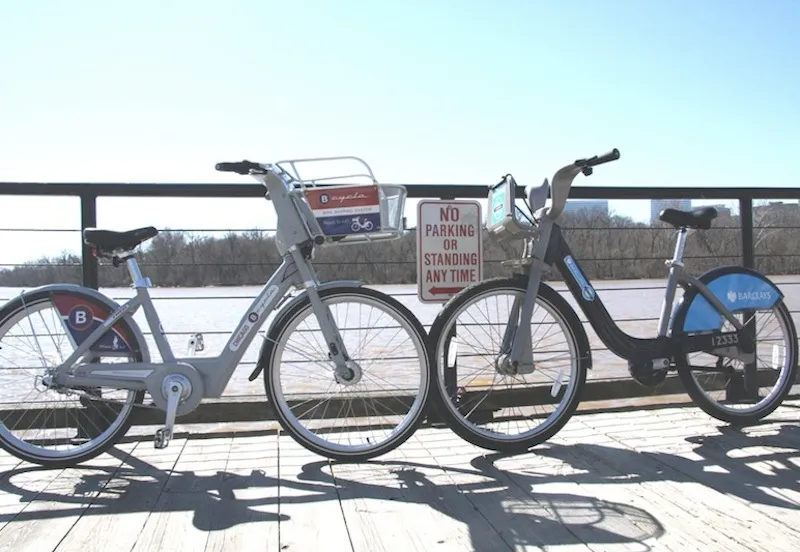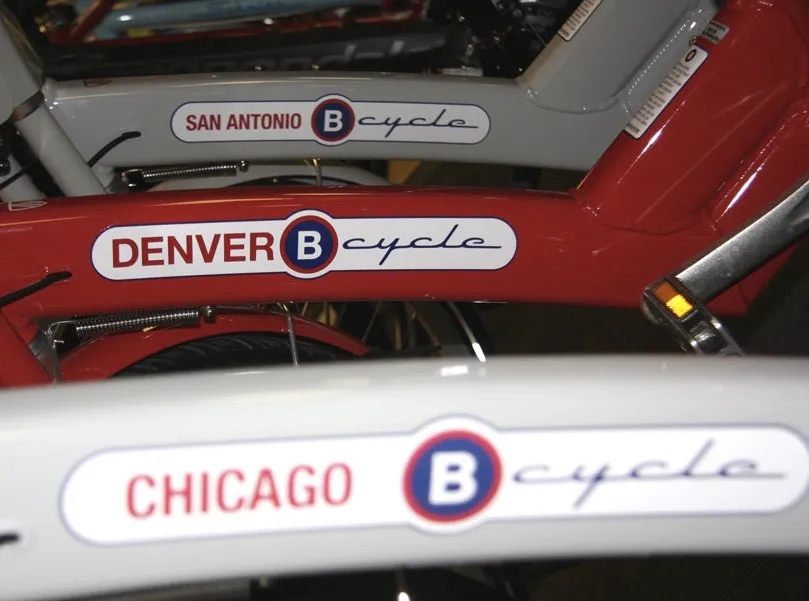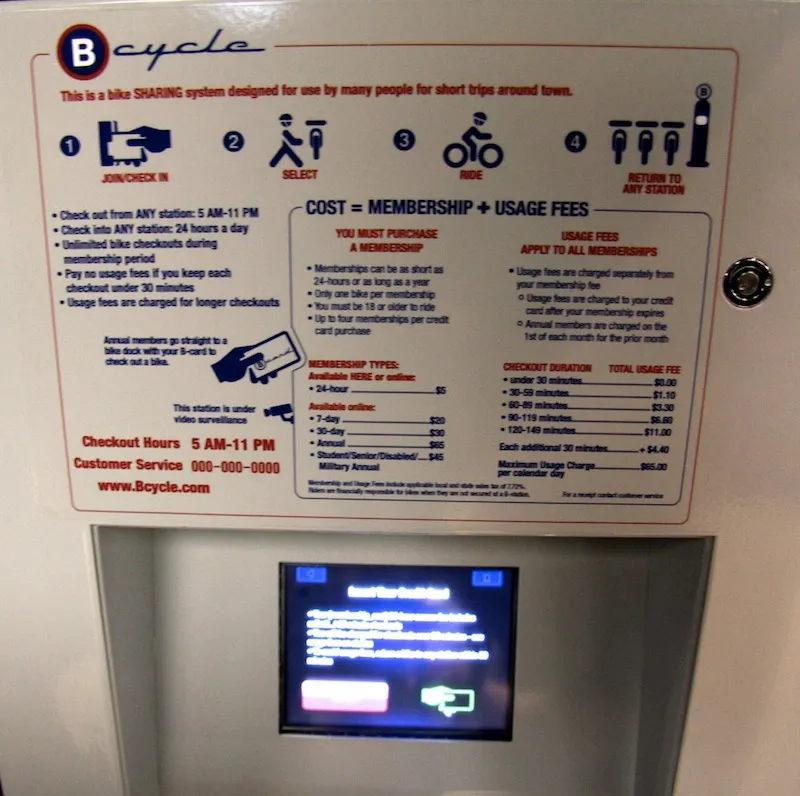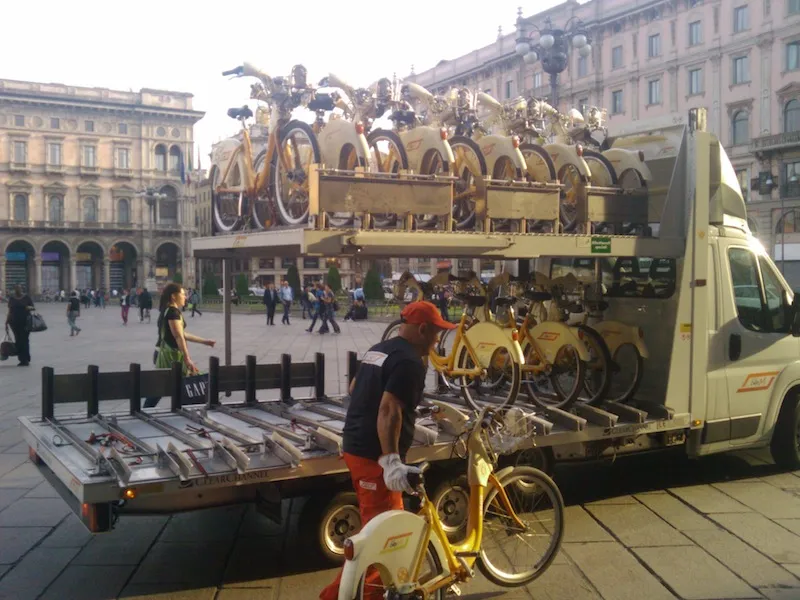In Milan, Italy yellow bikes hang unlocked on long public racks. There's no charge to use them and the city even has employees to collect and rehang them if they become un-evenly distributed around the city. If you need a bike, all you have to do is grab one and ride it to the next rack.
A free system like this may never work in the United States, but pay-for public bike sharing is taking hold in the key metro locations where it's been introduced. The concept is simple: buy a membership – yearly or daily – swipe your card and check out a bike. Prices vary, but generally you're looking at membership prices between US$6 and $60, with the first hour of bike use included, then $4 per half hour thereafter. A $1,000 replacement fee encourages each bike's safe return.
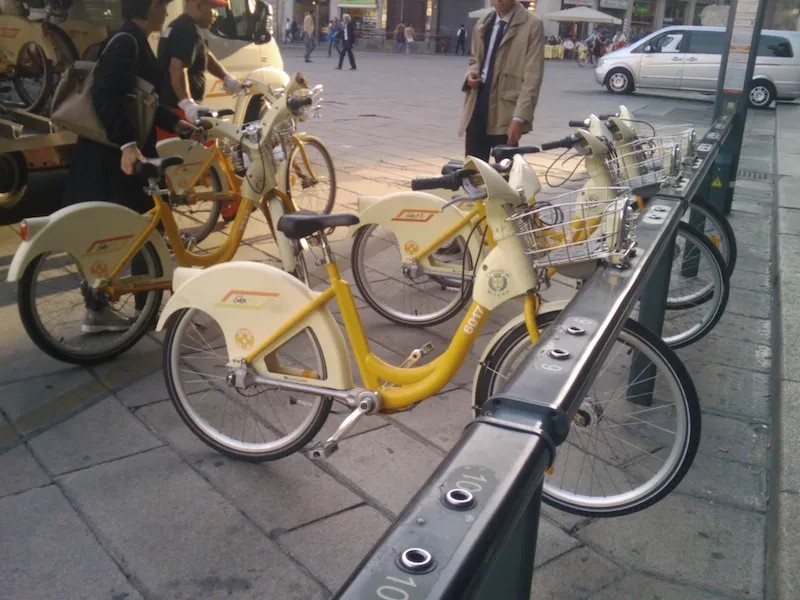
Milan's free yellow public bikes
Two companies are working to split the market across the US: B-Cycle, a joint effort between advertising agency Crispin Porter Bogusky, Humana healthcare and Trek Bicycle Corporation, and PBSC Urban Solutions, the people behind BIXI. Both companies supply the bikes, build the docking stations and provide the tracking systems needed to run each scheme.
B-Cycle currently operate in 11 cities, ranging from big metros like Chicago, Illinois and Denver, Colorado, down to smaller cities like Boulder, Colorado and Broward County, Florida. They emphasis the value of the scheme not only for transportation, but also as a solution to one of America's most menacing health problems, obesity.
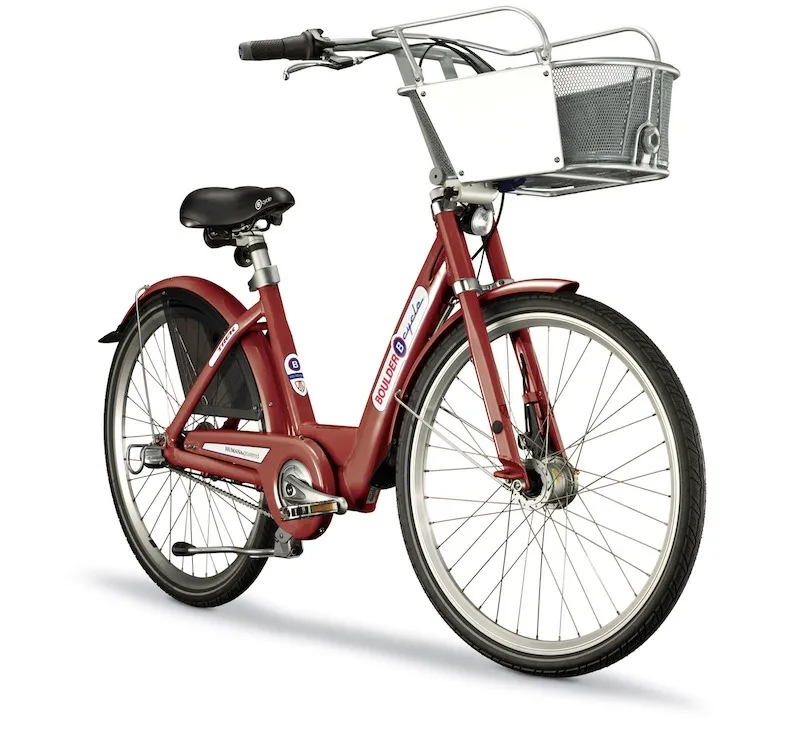
The B-Cycle public bike
As well as B-Cycle are doing in the US, Public Bike System/ BIXI are succeeding internationally. The Canadian company operate in eight major metro areas worldwide, three of which are in the US cities of Boston, Massachusetts, Minneapolis, Minnesota, and Washington DC, the latter of which is host to the National Bicycle Summit, held annually.
Minneapolis's bike share system was one of the first to be rolled out in the US. "At the time when we did our evaluation two-and-a-half years ago I believed that the [BIXI system] was the best in the world," Bill Dossett, executive director of Nice Ride Minnesota, told BikeRadar. "The key factor is that they had an operating system and had experience and that wasn't true of B-Cycle at the time. But I can now say very positive things about the B-Cycle system: the bikes are very rugged, most of the bikes in these systems are very rugged, a lot of smart design has gone into these bikes in the last two years."
Despite their short tenure the bike sharing systems have proven themselves viable. "We're over the major failure points: theft and vandalism, the systems in place are surviving; the safety record of the systems are, so far, extremely positive, and liability has not been an issue," said Alison Cohen, the president of Alta Bicycle Share, which runs the BIXI programs in Boston, MA and Washington DC. "Those are the three things that could cause an immediate failure. In markets where it [bike sharing] is not so obvious, it might need some time to succeed."
Strong growth for the longest running programs
For all intents and purposes, bike sharing has only been up-and-running in the US for one full season. The bike share programs in Denver, Minneapolis and Washington are the largest, have been around the longest and are seeing massive growth. The three programs all launched in the first part of 2010 between April and July. Denver's program is up more than 20 percent from last year's total at time of writing, and Washington's BIXI scheme reports over 150,000 rides to date this season.
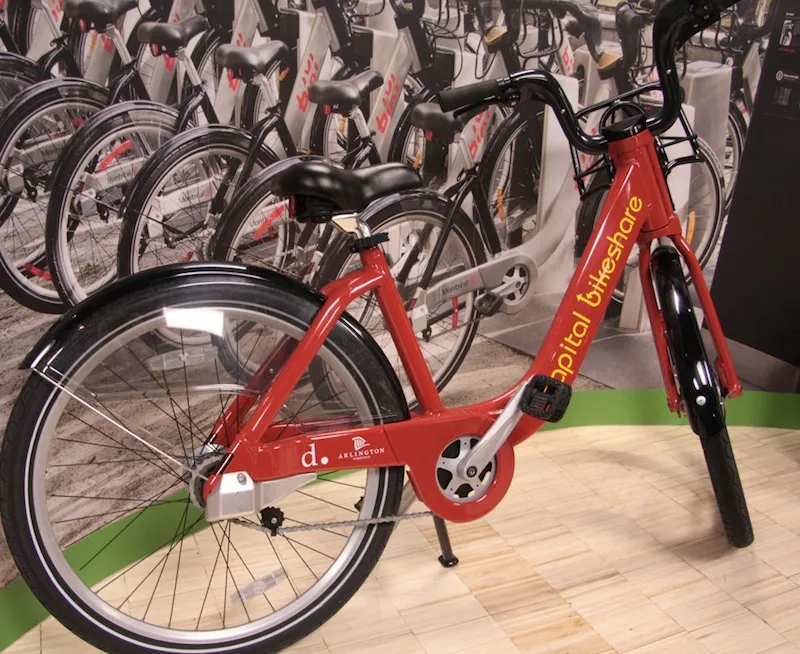
Washington DC Capital Bike Share's BIXI bike
The smaller shares are growing as well. Boulder's B-Cycle announced the opening of their 12th kiosk just this week – the program started sharing bikes on 20 May – and plans to have 17 up-and-running by year's end. "We've had great user numbers both from residents and visitors," Elizabeth Train, executive director of Boulder's B-Cycle, told BikeRadar. "I think people who come to Boulder look at everyone out on bikes and they want to explore Boulder the way the locals are doing it." The scheme has gained roughly 900 annual members during its first three months, at the cost of US$60 per membership.
Bike share isn't just for the hipsters
While many of the cities listed above are fairly progressive metro areas, bike sharing is becoming an increasingly important option for local governments, both to provide alternative transportation and as a way to combat obesity. B-Cycle programs have cropped up in city centers known for their dependence on the automobile – namely Omaha, Nebraska and Spartanburg, South Carolina. In these cities, officials have seen bike sharing as a gateway to help get their constituents onto bikes, in an effort to incorporating health consciousness with green transportation.
And it seems to be working. "There's a citywide campaign going on right now to fight obesity," said Matt Martin, Omaha B-Cycle's executive director. "Omaha is ranked number 142 in a list of cities in regards to healthiness. And they've been working on a number of different initiatives to try and combat that over the past year-and-a-half. Active transportation is one of the main parts of that larger effort to combat obesity."
"The city is also right in the middle of a transportation master plan review," Martin added. "They're looking at what transportation is going to look like in the City of Omaha for the next 30 years. There's a lot of interest to get away from the car and look at other things, and bikes are definitely in the mix... so bike sharing is a natural choice."
Making bike sharing happen in the US: it still takes a champion
Despite the growth and seeming success these programs have experienced, each and every one wouldn't have started without a local or regional champion, either from local government, a non-profit organization or a large, influential corporation. "I think having a passionate local leader is absolutely critical," said Boulder B-Cycle's Train. "Whether it's government, the mayor... that's absolutely key."
One of the US's most controversial business segments – healthcare – has been one of the leading supporters of bike sharing. Humana are founding partners of the B-Cycle program and regional branches of BlueCross and BlueShield have provided seed money and supported both B-Cycle and BIXI programs across the country. In Denver, Kaiser Permanente provide substantial support to the city's B-Cycle program and helped get it off the ground. "It's an investment," said Lee Jones, B-Cycle's director of sales, who works under Trek's umbrella. "These companies see that it's good for their policyholders and it's good for us [Americans] in general to be more active. It saves us a lot of time and probably reduces a little bit of stress."
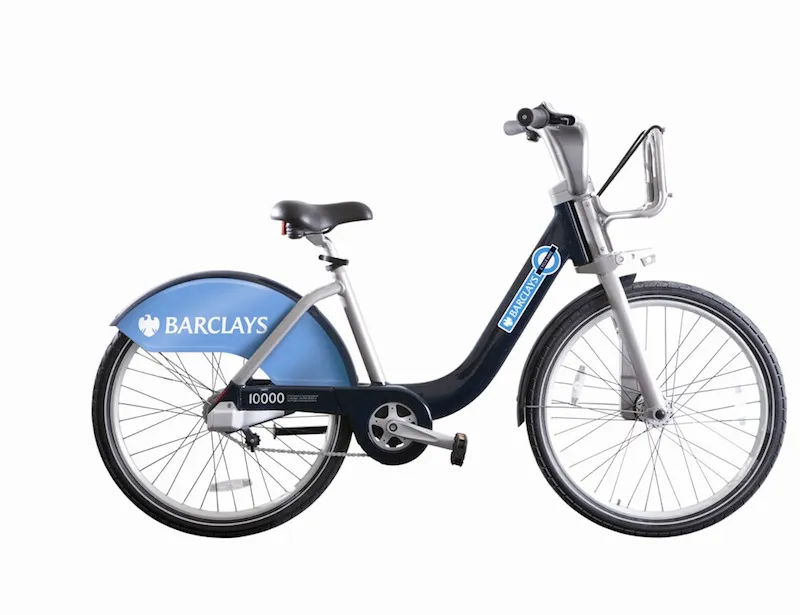
Both B-Cycle and BIXI's bikes (above) are rugged, durable and easy to ride
The perfect storm helped make Minnesota’s Nice Ride bike share program a reality. "We have a mayor, R.T. Rybak, who was just crazy about it – he saw it in Paris and said 'we have to have it here', so we had huge political support," said Dossett. "Blue Cross and Blue Shield of Minnesota, the largest health insurers in Minnesota, they stepped up right away and said, 'we'll put $1mil towards buying these bikes and stations'. And third, we had the benefit of a pilot program from the Federal Highway Administration that set aside money for independent bike and pedestrian projects... those pilot dollars enabled us to move quickly."
"People are starting to understand the connection between active living, health and a great place to live and work, so if you can build a place that people want to ride a bike, you're building a place that people want to be," Dossett added. "It's really that simple."
"Bike sharing offers this potentially transformational mode where people are on them, in your face, all year round, and it's only $5," said Cohen of Alta Bicycle Share. "You don't have to go to a bike shop and do a bunch of research; it's just five bucks, give it a shot and most people really like it. It lowers that barrier to entry [to bicycles] so much."
